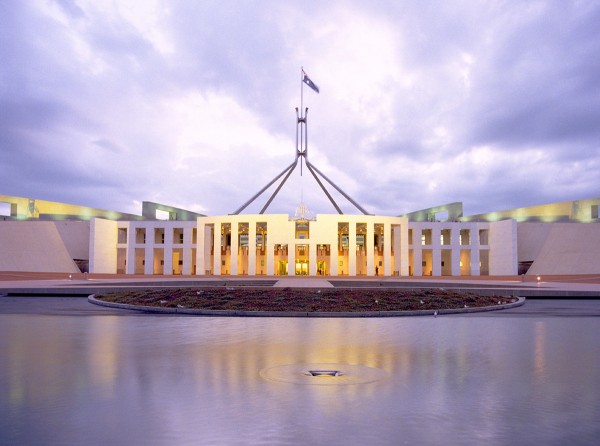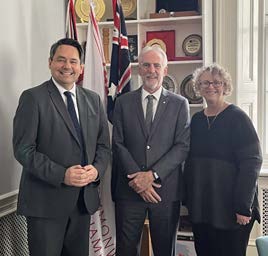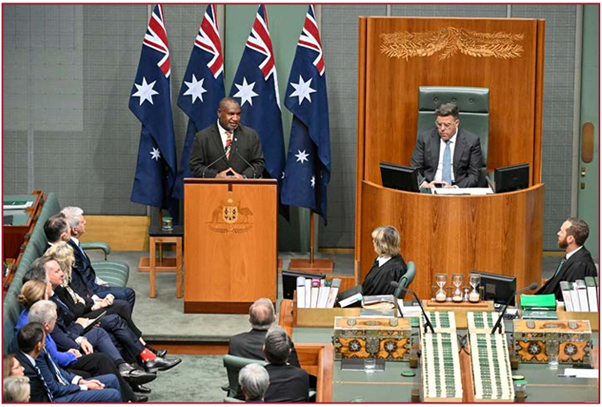Levelling the Playing Field for the Territories in Australia


For 25 years, Australians living in the two mainland Territories of Australia (Australian Capital Territory and the Northern Territory) have had fewer democratic rights than their neighbours who live in the States (New South Wales, Queensland, South Australia, Tasmania, Victoria, and Western Australia). This is because the Federal Parliament (known in Australia as the ‘Commonwealth Parliament’) passed laws in the 1990s to prohibit the elected Legislative Assemblies of the Northern Territory (NT) and Australian Capital Territory (ACT) from debating and legislating on voluntary assisted dying. It created a two-tier democracy in Australia, where the extent of your democracy was determined by your place of residence.
This was possible by virtue of Australia’s Federation, in which the legislative powers of State Parliaments are enshrined in the Australian Constitution, whereas the powers of the Territories are enabled by Federal legislation and can be amended like any other law. While the NT and ACT have Legislatures that govern and make laws for their jurisdictions, the lack of constitutional protection means the Federal Parliament can place limits on their legislative powers whenever it sees fit.
Background
The issue of Territory Rights was thrust into the spotlight a quarter of a century ago when the Northern Territory passed the Rights of the Terminally Ill Act 1995, legalising voluntary assisted dying. The Northern Territory was the first jurisdiction to take this step anywhere in the world.
In response, the then Federal Member for Menzies, Hon. Kevin Andrews, a conservative member of the Liberal Party, introduced the Euthanasia Laws Bill 1996 which amended the Northern Territory and Australian Capital Territory Self Government Acts. The effect of the amendment was to prohibit the Territories’ ability to legislate on matters relating to voluntary assisted dying. The Bill – which was commonly known as the Andrews Ban, Andrews Law or Andrews Bill – passed the Australian House of Representatives by 88 votes to 35 and the Australian Senate by 38 votes to 33.
While specifically targeting the Rights of the Terminally Ill Act, Mr Andrews made sure to include in his Bill the same prohibitions on the ACT, Australia’s most progressive jurisdiction. Had the Federal Parliament the constitutional power, we would probably have seen this prohibition extended to the State Parliaments as well. Indeed, one Member of the House of Representatives, Mr Terry Young MP, argued in the recent debate that: “We need to have a good conversation about the Constitution in this country, and we need to change a few things so that the federal government can take its rightful place and lead when it comes to… matters of conscience such as euthanasia… and not hand it to the States.”
So, for over twenty years the NT and the ACT remained gagged and bound by this ban, despite many attempts by passionate campaigners and Parliamentarians to right this wrong. And while the Andrews Bill had the primary effect of stripping the Territory Parliaments of the right to legislate on this specific issue, the broader signal it sent to residents of the ACT and NT was clear: your democracy is fallible. Your democratic rights are not the same as those of your neighbours living on the other side of the border. You are second class citizens.
Case for Change
Since the Andrews Ban came into effect, many jurisdictions around the world have debated and legislated voluntary assisted dying.
In 1995, the NT law was not only an Australian first but was world leading. One of the argued justifications for the discriminatory Andrews Law had been to stop the Territories from getting too far ahead of the rest of the country. But the political landscape around voluntary assisted dying laws has shifted significantly in the years since the 1990s. Every Australian state has now voted to introduce voluntary assisted dying laws, meaning the Territories were being left behind – held back by the Andrews Law.
The battle to restore Territory rights has been waged ever since the Andrews Law came into effect, with eight attempts over 25 years to repeal the Andrews Law.
Community advocates and the Territory Legislative Assemblies were strong advocates to overturn the Bill, including former NT Chief Minister Marshall Perron, ACT Minister for Human Rights Tara Cheyne, Chief Minister Andrew Barr, and former Chief Minister Katy Gallagher. Senator Gallagher continued this advocacy in the Federal Parliament when she was elected to the Senate, while ACT Labor MP Hon. Andrew Leigh, and former Senators Lyn Allison, Bob Brown, and Richard Di Natale were among those who unsuccessfully tried to overturn the Andrews Law in the past. The last bid, in 2018, was defeated in the Australian Senate by just two votes.
One of the deciding votes in 2018 was ACT Senator Zed Seselja, who voted No against the clear wishes of the vast majority of his constituents. In 2022, he was replaced by Senator David Pocock – an advocate for Territory rights.
The tide turned in 2021 when then Labor Opposition Leader Anthony Albanese pledged to allow a vote to restore the rights of the Territories if Labor won the 2022 election. Labor won a majority in the 2022 election and now Prime Minister of Australia, Anthony Albanese confirmed that his government would allow debate on a Private Member’s Bill early in the 47th Parliament – something that had been a hefty hurdle in previous Parliaments where governments who were unsupportive of this reform controlled the agenda of the lower house.
The Bill
As MPs representing the Territories, we agreed that we would co-sponsor a Private Member’s Bill to repeal the Andrews legislation to restore Territory rights. On behalf of the overwhelming majority of people who call the Territories home, we introduced the long overdue Restoring Territory Rights Bill 2022 on 1 August 2022.
The Restoring Territory Rights Bill did not legislate voluntary assisted dying in the Territories. It sought to simply repeal the Andrews Law, thereby restoring the rights of self-determination to the people and Parliaments of the ACT and the NT. It would allow the people of the ACT and NT to debate the matter and decide for themselves. Both Labor and Coalition MPs were granted a conscience vote on the issue, and the Bill passed the House two days later, on 3 August 2022, with 99 votes for and 37 against. The Bill then passed the Senate on the voices after a long debate on 1 December 2022 – the last night of Parliament for the year.
It is important to note that this Private Member’s Bill did not legislate on voluntary assisted dying. Members of Parliament were not voting on the issue of voluntary assisted dying, but on the rights of Territorians to decide for themselves. The Bill did not automatically revive the NT’s Rights of the Terminally Ill Act 1995.
That Act has no force or effect. This Bill was about democratic equality and fairness. For too long, Australians living in the Territories had been treated as second class citizens when it comes to legislatin to legislating on matters that impact their own lives. It was well past time for that to end. It was called the Restoring Territory Rights Bill because that is all it sought to do – to level the democratic playing field and restore legislative rights to the Territories. As federal legislators, it was not our role to treat this as a vote by proxy for or against voluntary assisted dying. That was not our responsibility. That responsibility lies with the democratically elected Members of the NT and ACT Legislative Assemblies, should they choose to introduce legislation on this issue. The Restoring Territory Rights Bill 2022 simply removed constraints that the Federal Parliament placed on the legislative powers of the NT and ACT a quarter of a century ago. The Bill restores the democratic rights of citizens in the Territories by removing a constraint on the legislative authority of their elected representatives which does not exist on any other issue anywhere else in Australia.
Conclusion
Many in Australia in 1996 were not ready for the reality of voluntary assisted dying. But in 2022, our Bill ensured that the Parliaments of both the NT and the ACT, and the people they represent, can interrogate the issue in a time and manner of their choosing. And if they do choose to legislate on this matter, they will have the full advantage of being able to draw on the legislative legwork done by all of the Australian States, plus that of other nations.
Voluntary assisted dying is an issue with strong views on either side of the discussion and implications for many. Some people have legitimate concerns about voluntary assisted dying. One of the Bill’s sponsors, and authors of this article, Luke Gosling MP, is on the record as being against euthanasia. His priority is to ensure strengthened palliative care and for any future voluntary assisted dying legislation to have strong safeguards to protect the vulnerable. But it’s not our job in the Federal Parliament to decide on that issue itself. It is our job to ensure that all Australians have an equal right to the discussion. It is a debate that the Territories really need to have and should be allowed to have. This Bill enables both the NT and ACT to do that.
Ultimately, it will be up to the NT and ACT Legislative Assemblies to do an extended and thorough consultation with all Territorians on whatever legislation they might choose to bring forward to ensure that the matter is thoroughly understood before it may be enacted.
During the debate, many colleagues expressed concerns about voluntary assisted dying for reasons relating to their faith or for other personal reasons. But as the passage of the Bill shows, many of them were united in knowing that their support of this Bill did not automatically confer support for voluntary assisted dying. Instead, we had asked our colleagues from around the country to support our constituents to have the same democratic rights that their constituents already did. We did not legislate for that. We were simply righting an old wrong and ensuring that all Australians had equal democratic rights. That was our job – to ensure fairness across the board for all our citizens, regardless of whether they live in a State or a Territory.
As the Bill passed the Federal Parliament, it was immensely gratifying to know that we had, after 25 years, succeeded, and that its passage helped to make the rights of Territorians equal to those of other Australians.
Further Reading: The Parliamentarian 2023: Issue One featured a Third Reading report from the Australia Federal Parliament about the Private Members Bill which allowed the ACT and NT to pass laws on this issue
This article was written by
 Hon. Alicia Payne, MP is the Australian Federal MP for Canberra since 2019. Her background is in economics and social policy, and previously she worked as a Research Fellow at the National Centre for Social and Economic Modelling (NATSEM), at the Australian Treasury and as a policy adviser to the Federal Labor Party.
Hon. Alicia Payne, MP is the Australian Federal MP for Canberra since 2019. Her background is in economics and social policy, and previously she worked as a Research Fellow at the National Centre for Social and Economic Modelling (NATSEM), at the Australian Treasury and as a policy adviser to the Federal Labor Party. Hon. Luke Gosling, OAM MP is the Australian Federal MP for Solomon, which covers Darwin and Palmerston. He was elected in 2016, 2019 and 2022. Previously, he was a military officer in the Australian Army, in particular serving in Timor-Leste, then he was an Advisor to the President of Timor-Leste and CEO of the St Vincent de Paul Society.
Hon. Luke Gosling, OAM MP is the Australian Federal MP for Solomon, which covers Darwin and Palmerston. He was elected in 2016, 2019 and 2022. Previously, he was a military officer in the Australian Army, in particular serving in Timor-Leste, then he was an Advisor to the President of Timor-Leste and CEO of the St Vincent de Paul Society.

